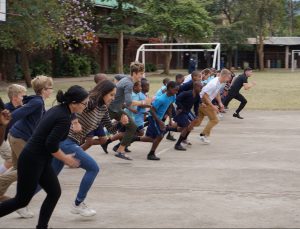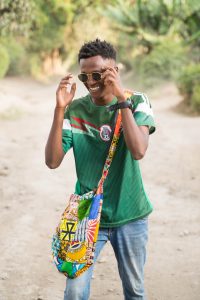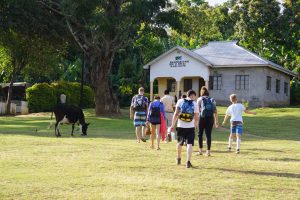The Significance of Education and Community
Education is arguably one of the most essential tools utilized to move up in life. Through education, one may receive the chance to expand critical thinking or discover new interests. At times education can also serve as an instrument to break out of poverty and to enable one to help the surrounding community like at the School of St. Jude, here in Arusha. This past week, we were welcomed to St Jude and introduced to its story and mission. St Jude recruits high achieving students who are impoverished with the intention of the students using the resources provided to rise and reciprocate the gift they received with the community they grew up with. Fortunately, we were able to participate in the classes and witness the uniqueness of every one of the students attending St. Jude.

We kicked off our visit with an introduction and tour. It was evident that St Jude was using its resources to create a space that recognized and respected the culture of their students. For instance, they filled the walls with colored maps of the region and tribe names and also included culturally relevant material in the classroom. The tour guides were St Jude graduates themselves who devoted a year of service to display their gratitude. English was highly emphasized in the school, but they mentioned that speaking in Swahili was not heavily punished. This made our group a bit uneasy, but the intent was to equip students with what has become a universal language. St Jude not only offers a way to persevere but makes sure to break away from the legacy of colonialism as best as possible. At the end of our tour, we were encouraged to join students at tea time and playtime. I chose to join a soccer game alongside Ryan. We found it quite difficult to get our head in the game due to a swarm of primary students quickly turn what was a soccer game into rugby, but we did our best! The kids played as if their lives depended on the outcome of the match. I soon came to find out why. The winners of the match gained bragging rights which entailed eccentric dancing and chanting of the final score: 2 to 0. I am all for playing games for fun, but after experiencing the friendly taunts I could not help but desire to win. Luckily, that was not the only game we were given the chance to participate in. At the end of tea time, the group was split into two. One group explored an art class while another joined a gym class. Due to my experience at playtime, I was inclined to choose the gym class. We got to enjoy a class that was led by an instructor who genuinely cared about the student’s well-being and entertainment. Our visit to St Jude ended with us being paired up with a primary student to read through picture books. This activity further emphasized cultural relevance. Each of the books Alvin, my reading buddy, and I read was about animals that are prevalent in Tanzania. Catering to students is essential in fostering intrinsic motivation. I know St Jude is doing a good job because seeing Alvin laugh and enjoy reading helped me stir up more intrinsic motivation in pursuing a teaching job in the future.

The rest of the week contained our public health midterm exam. Having our first major assessment of the program made many of us feel nervous, but we were reminded that an exam is simply an exam. We made it through and were able to celebrate with our first dinner out of the Mwangaza Center. We were blessed with an assortment of chicken, rice, beans, and vegetables. During our dinner, the faces behind our Global Playlist choices, a playlist made of songs submitted by every student and the Leer family, were shown through a fun guessing game. Elijah came out on top with a total of 17 correct answers out of the 24!

Our weekend was spent at the Hot Springs and Ifulong for the second round and a day to relax or explore. On Sunday, I decided to go to mass with my friend Daniel, a local in the community. The members were welcoming and came from various regions of the world. The church I went to provides service in English, so I received a small glimpse into the wide range of people Arusha attracts. Daniel also led a small group of us into town to visit a market the following day. The streets and aisles of the market were vibrating with energy. People were coming and going on foot along with various forms of transportation passing within inches of us. Without Daniel, I would have been lost in what seemed to be a labyrinth. The market had a wide range of items for sale with music blasting and laughs all around us.

These days displayed how valuable an education truly is. Kids in Tanzania are very capable of doing big, innovative things with limited resources. I have seen it with my own eyes. I can only imagine how much more kids would be able to do if an education such as the one at St Jude was made available to all those who desire it. The communal aspect is just as essential. From the learning community at St Jude to the larger one present in Arusha and even the one we are constantly knitting on this program, love and support help create change. A learning community can build and expand despite limited resources by fostering the intellect and drive already present. Arusha has many aspects that are constantly developing and being preserved by those who are within its boundaries. Then there is our Global community. We are undergoing an educational experience that exposes us to things that we may never have encountered or had never been given the chance to live, so having a loving, supportive group with faith shared among us will help us to expand our minds and discover perspectives that are new to us. Depending on the community, values shared may be different, but the significance placed upon the community is shared among them all.
— Johny Salinas ‘21
You must be logged in to post a comment.